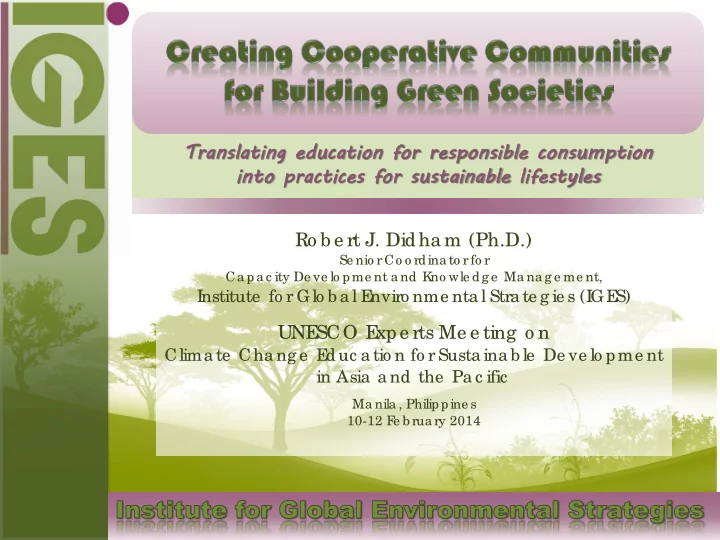

Tra ranslating e edu ducation fo for r re responsible c cons nsumption into nto pract actice ces f for s sustai ainable li life festy tyles Ro b e rt J. Didha m (Ph.D.) Se nio r Co o rdina to r fo r Ca pa c ity De ve lo pme nt a nd K no wle dg e Ma na g e me nt, I nstitute fo r Glo b a l E nviro nme nta l Stra te g ie s (I GE S) UNE SCO E xpe rts Me e ting o n Clima te Cha ng e E duc a tio n fo r Susta ina b le De ve lo pme nt in Asia a nd the Pa c ific Ma nila , Philippine s 10-12 F e b rua ry 2014
What is E duc ation for Sustainable Consumption? When hen yo you u thi think ab about ut ho how w Educa ucatio ion f for Sus usta tain inable C Consump umption is is taug taught in yo your ur co coun untry, what what typ types es of imag images es co come me to to min mind?
Is this E SC? – Option 1
Is this E SC? – Option 2
Is this E SC? – Option 3
Problem Oriented ESC : • Highlighting the impacts of unsustainable consumption. • Explaining the science of climate change. • Addressing the limits to growth, resource supplies & flows, and planetary boundaries. • Setting the urgency for action now! Mitigation & Abatement Oriented ESC: • Highlighting opportunities for reducing the impacts of unsustainable consumption (i.e. recycling and 3Rs). • Identifying more responsible consumption options provided within current market system (i.e. ecolabel and energy efficient products). • Targeting individual responsibility for addressing sustainable consumption challenges. • Setting agenda that wiser resource use is key to sustainable consumption. Solutions Oriented ESC: • Active exploration of solutions for responsible and sustainable living. • Encouraging learning through cooperation & collective engagement. • Oriented towards creating locally-based means for addressing both sustainable production and consumption. • Aimed at establishing alternative paths to securing healthy living, well-being, resilient communities, and productive ecosystems.
Challe nge of E duc ation for Sustainable Consumption “ The main challenge in relation to education for sustainable consumption is how to support initiatives which stimulate the individual’s awareness of the central role they play in forming society and empower them to choose responsible, sustainable lifestyles.” (UNEP: Here and Now , 2008: 9)
Conc e ptual E volution of “Consume r s” Consumer Awareness of the environmental impacts of their consumption Producer Understanding that Responsibility Consumption Patterns are affected by Waste Management & lifestyle Pollution Abatement choices and also systematic/ institutional Consumer factors – Protection & Safety Consumers must have an active role in ‘Consume social change & to support transformation Development’ to achieve sustainable lifestyles * With an increasing level of responsibility and duties attached to the consumer’s role at each new conception.
Solutions Orie nte d E SC “Creating Sustainable lifestyles means rethinking our ways of living, how we buy and what we consume, but it is not only that. It also means rethinking how we organize our daily life, altering the way we socialize, exchange, share, educate and build identities. It is about transforming our societies towards more equity and living in balance with our natural environment.” UNEP (2011) Visions for Change: Recommendations for effective policies on sustainable lifestyles. Paris: UNEP-DTIE; (pp. 6).
Obje c tive s of Solutions Or ie nte d E SC • Transition from a problem-oriented focus to a solutions-oriented focus. • Individuals’ realisation of personal roles and responsibility in the pursuit of sustainability. • Addressing the “Value-Action Gap”. • Improvement of Quality Education. • Strengthening Life-long Learning Skills. • Empowering collective envisioning of a sustainable future and cooperative action for its achievement. • Inspiring Transformative, Social Learning.
Pr inc iple s of Solutions Or ie nte d E SC • Experiential education based on critical reflection & practice and problem solving. • Creating communities of practice and opportunities for cooperative inquiry & reflexive discourse. • Engagement in local community, contextualised learning, and cultural relativism. • Knowledge production through iterative interaction. • Group processing to establish and manage systems of knowledge and making sense of new information. • Participation and power sharing, shared ownership/commonality. • Positive interdependence and trust building. • Holistic teaching applying whole systems thinking/perspective. • Interdisciplinary and cross-boundary teaching.
Me ans for Ope r ationalising Solutions Or ie nte d E SC • Schools should provide safe and effective Learning Environments as models of sustainable practice for experience- based learning and as hubs of community learning. • Improve Quality and Relevance of Curricula through application of progressive learning objectives, use of clear learning methodologies, and provision of skill-based learning. • Provide Cooperative and Participatory Learning opportunities for relexive discourse and collaborative action. • Develop critical Analysis and Problem Solving Skills , measured through use of performance based assessment. • Enshrine both Global Citizenship & Peace Education and Values-Based Learning into the learning process (applying multi-cultural perspectives, service learning, and capacity building for civic engagement).
E SD L e ar ning Pe r for manc e F r ame wor k Ofei-Manu and Didham (2012) Assessment of Learning Performance in Education for Sustainable Development ; p.108
Thank you for your kind attention! F o r F urthe r I nfo rmatio n & Co ntac t Robe r t J. Didham Pro g ra mme Ma na g e me nt Offic e I nstitute fo r Glo b a l E nviro nme nta l Stra te g ie s 2108-11 K a miya ma g uc hi, Ha ya ma , K a na g a wa 240-0115 Ja pa n E -ma il: didha m@ ig e s.o r.jp URL : http:/ / www.ig e s.o r.jp/
Recommend
More recommend